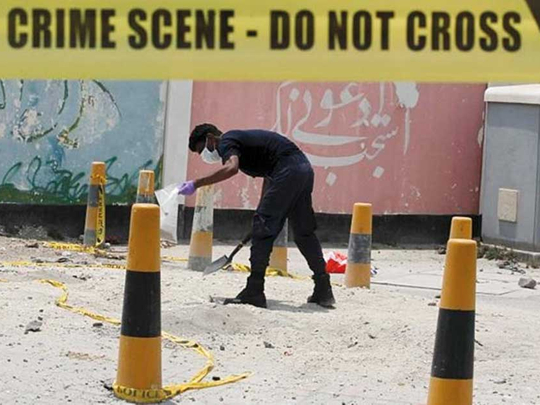
Dubai: Bahrain announced Thursday it has pressed charges against 25 men over an attack on police in the country.
The public prosecutor’s office said the 25 — including 14 already in detention— stand accused of a February 26 bombing that wounded four officers in a bus near Jaw village, southeast of the capital Manama.
They are charged with receiving military training in Iraq and Iran, which Bahrain has accused of inciting 2011 anti-government protests.
The charges also include alleged weapons smuggling and manufacturing, establishing or joining a terrorist group and attempted murder.
The first hearing is scheduled for October 19.
Jaw is home to a prison where anti-government militants are frequently held.
The facility in January was the site of a prison break that saw 10 inmates escape.
Bahrain’s parliament this year approved a constitutional amendment granting military courts the right to try civilians charged with terrorism, a vaguely defined legal term in the archipelago.
The men who built the secret bomb factory had been clever — suspiciously so, Bahraini investigators thought, for a gang known mostly for lobbing Molotov cocktails at police. The underground complex had been hewed, foot by foot, beneath the floor of a suburban villa, with no visible traces at street level and only a single entrance, hidden behind a kitchen cabinet.
Western intelligence agencies are seeing a new boldness by Iran in supporting armed insurgents in the kingdom, according to multiple analysts from the United States and two Western European governments.
Documents and interviews with current and former intelligence officials describe an elaborate training programme, orchestrated by Tehran’s Islamic Revolutionary Guard Corps, to school Bahraini militants in the techniques of advanced bomb-making and guerrilla warfare.
A wide variety of increasingly sophisticated weaponry — much of it forensically linked to Iran — has been discovered in Bahrain over the past three years, including hundreds of pounds of military-grade explosives that almost certainly originated in Iran, US and European intelligence officials say.
The efforts appear to mirror similar ongoing operations to build a network of pro-Tehran militant groups elsewhere in the Middle East, from Yemen to Iraq and Syria, several analysts said.
“We are seeing more evidence of an Iranian destabilisation effort,” said a US intelligence official with years of experience monitoring Bahrain’s civil and political unrest.
The official, like several others interviewed for a story in the Washington Post in April, insisted on anonymity in discussing sensitive intelligence from the region.
The mounting evidence has prompted unprecedented steps by US and European governments targeting alleged leaders of Bahraini militant groups.
On March 16, German authorities ordered the arrest of a Bahraini man — a 27-year-old asylum seeker living in Berlin — under international warrants accusing him of being a terrorist operative for the Al Ashtar Brigades, a Bahraini militant group that has claimed responsibility for deadly attacks against Bahraini police officers.
On March 17, the State Department — finalising an initiative begun during the final months of the Obama administration — imposed sanctions against two leaders of the same Bahraini group, formally designating the men as “global terrorists.”
The official announcement specifically accused Iran of backing the group as part of its “destabilising and terrorism-related activities in the region.”
And last week, the Trump administration moved to lift a freeze on the sale of F-16 fighter jets to Bahrain, reversing a decision made last year by the Obama administration to protest Bahrain’s outlawing of Al Wefaq, the country’s main Shiite opposition party.
The White House action suggests a new willingness to maintain a strong defensive shield against future Iranian aggression.












